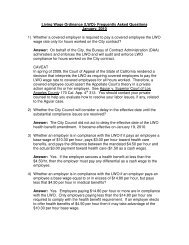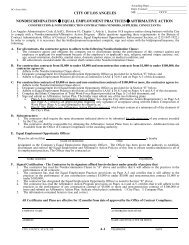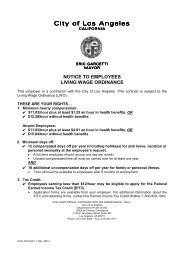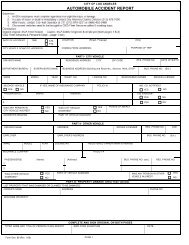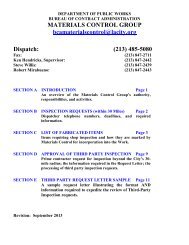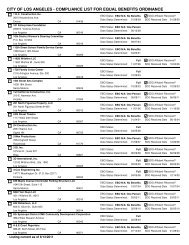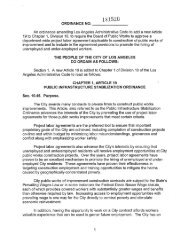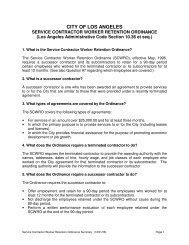CITY OF LOS ANGELES - Bureau of Contract Administration - The ...
CITY OF LOS ANGELES - Bureau of Contract Administration - The ...
CITY OF LOS ANGELES - Bureau of Contract Administration - The ...
Create successful ePaper yourself
Turn your PDF publications into a flip-book with our unique Google optimized e-Paper software.
<strong>CITY</strong> <strong>OF</strong> <strong>LOS</strong> <strong>ANGELES</strong><br />
EQUAL BENEFITS ORDINANCE<br />
(Los Angeles Administrative Code Section 10.8.2.1)<br />
1. What is the Equal Benefits Ordinance?<br />
<strong>The</strong> Equal Benefits Ordinance (EBO) requires that City contractors who provide benefits<br />
to employees with spouses must provide the same benefits to employees with domestic<br />
partners.<br />
2. What types <strong>of</strong> agreements are covered by the Ordinance?<br />
<strong>The</strong> Ordinance covers any City agreement over $5,000. This includes agreements for<br />
grants, services, the purchase <strong>of</strong> goods, construction, and leases.<br />
3. When does the Ordinance become applicable?<br />
<strong>The</strong> original Ordinance became effective on January 1, 2000. <strong>The</strong> original Ordinance was<br />
applicable mostly to service contracts and leases <strong>of</strong> City property. However, in February<br />
2003, the Ordinance was amended to also cover competitively bid contracts such as<br />
construction and procurement contracts. Because <strong>of</strong> the amendment, the Ordinance<br />
applies to competitively bid contracts amended after April 1, 2003 and competitive bids<br />
released after May 1, 2003.<br />
4. Are agreements entered into before the effective date <strong>of</strong> the Ordinance affected?<br />
In general, agreements executed prior to January 1, 2000 become subject to the<br />
Ordinance if they are amended, modified, or renewed after January 1, 2000. For<br />
competitively bid agreements, the Ordinance becomes applicable if they are amended,<br />
modified, or renewed after April 1, 2003. At the time <strong>of</strong> amendment, modification, or<br />
renewal, the awarding authority must incorporate the requirements <strong>of</strong> the Ordinance into<br />
the agreement.<br />
5. Who is covered by the Ordinance?<br />
<strong>The</strong> Ordinance applies to the following:<br />
• Any contractor that has an agreement with the City.<br />
• All <strong>of</strong> the City contractor’s other operations located within the City limits, even if those<br />
operations are not involved in the City agreement.<br />
• Any <strong>of</strong> the contractor’s operations if it is on property owned by the City, or on property<br />
that the City has a right to occupy.<br />
• <strong>The</strong> contractor’s employees located elsewhere in the United States but outside <strong>of</strong> the<br />
City limits if those employees are performing work on the subject City agreement.<br />
Equal Benefits Ordinance Summary (Rev. 06/06) Page 1
6. What is a covered contractor required to do under the Ordinance?<br />
<strong>The</strong> Ordinance requires the contractor to:<br />
• Certify that equal benefits will be provided to employees with spouses and to<br />
employees with domestic partners.<br />
• Post a copy <strong>of</strong> the following statement in an area frequented by employees: “During<br />
the performance <strong>of</strong> a <strong>Contract</strong> with the City <strong>of</strong> Los Angeles, the <strong>Contract</strong>or will provide<br />
equal benefits to its employees with spouses and its employees with domestic<br />
partners.”<br />
• Allow the City access to records so that the City can verify compliance with the<br />
Ordinance.<br />
7. Are subcontractors also covered?<br />
This depends on when the prime contractor’s agreement with the City became subject to<br />
the Ordinance. If the prime contractor’s agreement with the City became subject to the<br />
EBO between January 1, 2000 and March 31, 2003, subcontractors working on the<br />
agreement are subject to the requirements <strong>of</strong> the EBO. If the prime contractor’s<br />
agreement with the City became subject to the EBO after April 1, 2003, subcontractors<br />
working on the agreement are not subject to the EBO.<br />
8. What benefits are included?<br />
<strong>The</strong> Ordinance applies to all benefits <strong>of</strong>fered by an employer. This includes, for example,<br />
bereavement leave, family medical leave, medical, dental, and vision benefits,<br />
membership or membership discounts, moving expenses, travel and relocation benefits,<br />
and retirement plans.<br />
9. How does the Ordinance define a “domestic partner”?<br />
“Domestic partner” means any two adults, <strong>of</strong> the same or different sex, who have<br />
registered as domestic partners with a governmental entity pursuant to state or local law<br />
authorizing this registration, or with an internal registry maintained by the employer <strong>of</strong> at<br />
least one <strong>of</strong> the Domestic Partners.<br />
10. What if the actual cost to a contractor <strong>of</strong> providing a benefit to an employee’s<br />
domestic partner is more than the cost <strong>of</strong> providing the benefit to an employee’s<br />
spouse?<br />
In that case, the contractor may require that the benefit will be provided to the employee’s<br />
domestic partner only if the employee agrees to pay for the extra cost <strong>of</strong> the benefit. <strong>The</strong><br />
contractor may do the same if the actual cost to the employer <strong>of</strong> providing a benefit to an<br />
employee’s spouse is more than the cost <strong>of</strong> providing the benefit to an employee’s<br />
domestic partner.<br />
Equal Benefits Ordinance Summary (Rev. 06/06) Page 2
11. What happens if a contractor is found to be in violation <strong>of</strong> the Ordinance?<br />
<strong>The</strong> City may take the following steps:<br />
• <strong>The</strong> contractor may be deemed to be in material breach <strong>of</strong> the City agreement.<br />
• <strong>The</strong> agreement may be canceled, terminated, or suspended, in whole or in part.<br />
• <strong>The</strong> City may also retain money due to the contractor<br />
• <strong>The</strong> contractor may be deemed a non-responsible bidder and disqualified from<br />
contracting with the City under the <strong>Contract</strong>or Responsibility Ordinance.<br />
• <strong>The</strong> City may pursue other legal remedies.<br />
12. What happens if a subcontractor is found to be in violation <strong>of</strong> the Ordinance?<br />
Because the contractor is responsible for making sure that all its subject subcontractors<br />
comply with the Ordinance, the enforcement actions listed in the previous answer may be<br />
applied to the contractor if the subcontractor is found to be in violation. See the response<br />
to question number seven regarding which subcontractors are subject to the EBO.<br />
13. Are there any exceptions or waivers to the Ordinance?<br />
An awarding authority may apply to the Department <strong>of</strong> Public Works, <strong>Bureau</strong> <strong>of</strong> <strong>Contract</strong><br />
<strong>Administration</strong>, Office <strong>of</strong> <strong>Contract</strong> Compliance (OCC) for a waiver in the following<br />
situations:<br />
• <strong>The</strong> contractor is the only provider <strong>of</strong> a needed good or service.<br />
• <strong>The</strong> contractor is the only bidder or contractor willing to enter into an agreement with<br />
the City for use <strong>of</strong> City property.<br />
• <strong>The</strong> agreement is necessary to respond to an emergency situation that endangers the<br />
public health or safety, and no contractor that complies with the law is immediately<br />
available.<br />
• <strong>The</strong> agreement involves specialized litigation as certified by the City Attorney’s Office.<br />
• <strong>The</strong> contractor is a public entity providing a good, service, or access to real property<br />
that is not available from any other source.<br />
• <strong>The</strong> contractor is a public entity and the good or service is necessary to serve a<br />
substantial public interest<br />
• <strong>The</strong> application <strong>of</strong> the Ordinance would conflict with the terms or conditions <strong>of</strong> a grant<br />
agreement with a public agency.<br />
• <strong>The</strong> agreement is essential to the City or the City’s residents and no other contractor<br />
that complies with the Ordinance is available.<br />
• <strong>The</strong> agreement is for a bulk purchasing agreement through City, federal, state, or<br />
regional entities that reduce the City’s purchasing cost.<br />
• <strong>The</strong> agreement involves the investment <strong>of</strong> certain types <strong>of</strong> monies, or instances in<br />
which the City will incur a financial loss that would violate the Treasurer’s or City<br />
Administrative Officer’s fiduciary duties.<br />
Equal Benefits Ordinance Summary (Rev. 06/06) Page 3
14. What if a contractor is subject to a collective bargaining agreement?<br />
<strong>The</strong> Ordinance does not apply to a collective bargaining agreement (CBA) that was in<br />
effect prior to the Ordinance becoming applicable to the <strong>Contract</strong>or. However, in order to<br />
contract with the City, the contractor must agree that if the CBA is subsequently<br />
amended, extended, or otherwise modified, the contractor will propose to the union that<br />
the requirements <strong>of</strong> the Ordinance be incorporated into the CBA. If the contractor agrees<br />
to do so, the contractor may be granted Provisional Compliance status allowing the<br />
contractor to begin working on the City agreement. When the Provisional Compliance<br />
status expires, the contractor must verify for the City the steps taken to come into<br />
compliance with the EBO.<br />
15. Who is responsible for administering and enforcing the requirements <strong>of</strong> the<br />
Ordinance?<br />
<strong>The</strong> Department <strong>of</strong> Public Works, <strong>Bureau</strong> <strong>of</strong> <strong>Contract</strong> <strong>Administration</strong>, Office <strong>of</strong> <strong>Contract</strong><br />
Compliance, located at 1149 S. Broadway Street, 3 rd Floor, Los Angeles, CA 90015. For<br />
additional information, please call (213) 847-1922, or go to the OCC website at<br />
www.lacity.org/bca.<br />
16. Where can a domestic partnership be registered?<br />
Many governmental agencies <strong>of</strong>fer domestic partnership registries. Two local<br />
governmental entities that <strong>of</strong>fer such registries include the County <strong>of</strong> Los Angeles and the<br />
City <strong>of</strong> West Hollywood.<br />
Los Angeles County<br />
Couples may file a Statement <strong>of</strong> Domestic Partnership with the Los Angeles County<br />
Department <strong>of</strong> Registrar-Recorder/County Clerk. <strong>The</strong> County registry is available to same<br />
sex and different sex couples. Couples must both be 18 years <strong>of</strong> age or older and at least<br />
one partner must reside or work within Los Angeles County.<br />
For additional information, contact the Registrar-Recorder/County Clerk at (562) 462-<br />
2060. <strong>The</strong> Los Angeles County Department <strong>of</strong> Registrar-Recorder/County Clerk webpage<br />
at http://regrec.co.la.ca.us/scripts/partnership.htm contains information on where to file a<br />
Statement <strong>of</strong> Domestic Partnership and forms that can be downloaded.<br />
City <strong>of</strong> West Hollywood<br />
Couples may apply for Domestic Partnership registration with City <strong>of</strong> West Hollywood’s<br />
Office <strong>of</strong> the City Clerk. <strong>The</strong> City <strong>of</strong> West Hollywood registry is available to couples <strong>of</strong> the<br />
same and different sex. <strong>The</strong> couple need not work in nor reside in West Hollywood to<br />
register.<br />
For additional information, couples may contact the City <strong>of</strong> West Hollywood’s Office <strong>of</strong> the<br />
City Clerk at (323) 848-6332. <strong>The</strong> City <strong>of</strong> West Hollywood’s website at www.weho.org<br />
contains information on Domestic Partnership status and forms that can be downloaded.<br />
Equal Benefits Ordinance Summary (Rev. 06/06) Page 4



